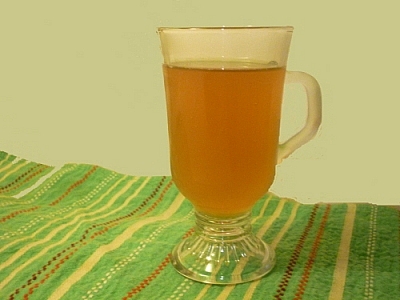After about thirty months of consuming kombucha tea on an almost daily basis, I can still confidently attest to its beneficial properties and recommend it without hesitation to healthy individuals looking to regulate their metabolism, improve their digestion, restore their intestinal health, revitalise their energy levels, and boost their immune system.

A few times now I’ve posted advice on brewing kombucha tea, but I recently became interested in learning more about kombucha and have learned so much that I really want to share all I’ve absorbed by correcting some misconceptions about kombucha, including a few I’ve been propagating myself.

In truth, I was never actually guilty of believing that kombucha tea is a cure-all for just about everything, but in Kombucha 101: Benefits and Preparation, I did make it sound like it is! In fact, kombucha tea can help relieve many symptoms and ailments, and can even eliminate some for certain individuals, but it shouldn’t be mistaken for actual cure, and results vary from person to person.
As Kombucha Kamp’s own Kombucha Mamma Hannah Crum says in an article about the health benefits of kombucha tea, “Kombucha is not a panacea — it doesn’t cure anything! It brings the body back into balance so that it may heal itself naturally. That is how it is able to do so much — because it works with your body’s natural immune system.”
Thankfully, our brewing method and ingredients are good, especially since we use wholesome ingredients. In Kombucha 101, I mentioned that any type of tea can be used but that green or black teas are best. That’s still the best advice I can give! I’ve since learned that herbal infusions and herbal tea blends are okay (see Exotic Teas & Kombucha), too, but Eileen Laird of Phoenix Helix says it’s not possible to “make kombucha with one hundred percent herbal tea.”
Likewise, I also noted that any type of sugar could be used, though the kombucha culture is said to prefer white sugar. But in Naturally Sweet Dreams: Red Berries, Brown Eggs, Minty Kombucha, and Apple Granola, I wrote that we’d switched from brown sugar to organic cane sugar. Yet Laird claims that “raw sugars are too difficult for the SCOBY to digest and the SCOBY suffers over time.” She even says that “Raw honey can actually kill the SCOBY, due to its anti-microbial properties.” Well then, thank goodness we never tried brewing our kombucha tea with honey like we said we would in that same article, thinking it would be a good solution for diabetics.
However, Sandor Ellix Katz says in The Art of Fermentation that “some people have reported excellent results making kombucha using honey, agave, maple syrup, barley malt, fruit juice, and other sweeteners; others have had their SCOBYs shrivel up and die.” Since we can vouch for the effectiveness of our kombucha tea made with organic cane sugar, we’re not going to drop it just yet. While there are many misconceptions about kombucha, we seem to be on the right track here (smiley face).
Still, we’re definitely going to be changing how we store our spare SCOBYs now that we’re better informed. Twice now, in both Kombucha 101 and Kombucha Tea 201: Tips and Tools, I’ve mentioned that we keep them in the refrigerator, but that’s actually quite harmful! Crum says that since SCOBYs are living organisms, they’re temperature-sensitive and can go dormant in low temperatures, disabling their ability to protect themselves, which, as Laird points out, is the very situation which leads to contamination and mould. No surprise then that this is one of the common misconceptions about kombucha I’d like to help straighten out!
Now I wouldn’t be doing anyone a favour if I didn’t qualify my statement in Kombucha 101 that kombucha tea actually helps alcoholics control their cravings. Since in the same breath I mentioned the tiny percentage of alcoholic content present in kombucha tea, my logic clearly failed me. Cravings are not being controlled when an alcoholic or recovering alcoholic consumes kombucha tea — they are being satisfied. This is one of the main misconceptions about kombucha that needs to be corrected, and pronto.
Interestingly, I discovered during my kombucha tea research that store-bought brands used to contain more alcohol “because the product is still fermenting in the bottle, and a long time can pass between bottling and purchase,” says Laird. After regulatory changes were made in the US, many store-bought brands now use pasteurization to stop fermentation from continuing. This just reaffirms my belief that commercial kombucha tea isn’t as beneficial as the home-brewed kind, which can be controlled by the maker.

Intrigued? Brew your own! Read Kombucha 101: Benefits and Preparation and Kombucha Tea 102: Tips and Tools to get you started, then get more help from Kombucha Mamma's free DIY Guide.
You can order one hundred percent organic SCOBYs fresh from Kombucha Kamp as well. Now that I’ve read up on kombucha tea, I’m more convinced than ever that it’s a bad idea to start a batch of kombucha tea from a dehydrated culture. And I don’t see the point of doing something for your health if it’s going to be contaminated with whatever icky stuff that humankind has started putting into its food. We like to use raw organic cane sugar and fair-trade organic green tea to brew our kombucha tea, which is why I recommend buying organically grown authentic kombucha starter cultures fresh from Kombucha Kamp.




Search Niackery
×